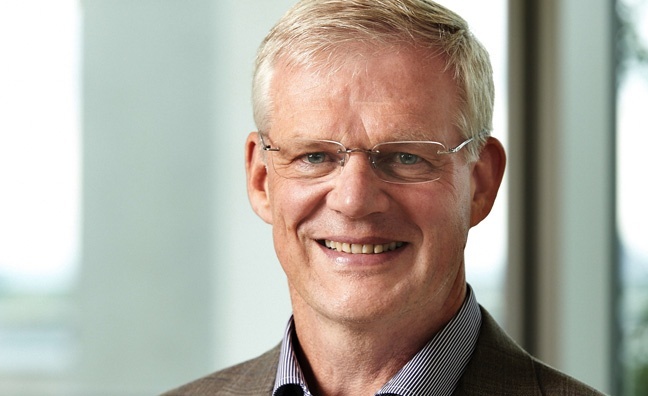PRS For Music CEO Robert Ashcroft has hailed the success of its strategy to evolve its online licensing business in line with the growth in streaming.
Speaking during the collection society’s AGM (May 24) at the British Library in London, Ashcroft said that its recent record results were down to its ability “to keep pace with industry change”.
But he was forced to open his address with a full explanation and apology for a series of overpayments in the last 12 months. These will be repaid or recouped from the next round of distributions, except for certain historical errors.
“Our focus now is on making sure that we do not have a recurrence of either these, or any similar problems in the future and we have been working hard to understand both their root causes and potential solutions,” said Ashcroft.
“We have been trying to maintain too ambitious a distribution schedule given our systems and the amount of data we are handling, and need, as an interim measure at least, to bring forward the cut-off for receipt of usage data to allow more time for checks to be made, before sending out the money. This will mean a one-off reduction in cash flow for our members, but we plan to recover this as our investments in new systems, analytical tools and business processes allow.”
Last month PRS revealed that its online collections increased by 52.7% to hit £122.9m
“If PRS is changing, so too is the industry,” said Ashcroft. “Streaming services continued to report increases in subscribers, significant catalogues were bought and sold, new deals were concluded with Facebook and YouTube. India and China attracted investment from Spotify, Google and Amazon. And copyright legislation was reshaped around the world, from Argentina to South Korea.
“Throughout this change, we delivered industry-leading revenue and distribution growth for members.”
Throughout this change, we delivered industry-leading revenue and distribution growth for members
Robert Ashcroft
Ashcroft stressed that its digital initiatives, including the pan-European licensing body ICE, were part of the mix for PRS, which has seen growth across its revenue strands.
“PRS is a pioneer and always will be,” he said. “We knew we needed to lead in online licensing. We identified the importance of collaborating with overseas societies. We focused our lobbying efforts on the need to secure a fair rate for the use of our members’ works online, and we wanted to evolve our public performance licensing from merely enforcing the need for music users to obtain a licence, to upselling the value of music to businesses.
“Taken together, these initiatives have enabled the value of our members rights to increase by almost two thirds over the past eight years.”
Ashcroft also praised the team behind the launch of its public performance licensing JV with PPL.
“This is the biggest operation of its kind in the world,” he said. “To have had such a significant transition from the respective public performance teams at PRS and PPL, to have built new systems and to develop new working practices, a new culture into what is now PPL PRS Ltd is testament to the work and dedication of many people.”
Ashcroft said he was “confident” in the staffing changes made at the top of company. He congratulated the team that secured the new Live Tariff deal that “will not only support the Live sector going forward, but will also support the continued growth of our members’ royalties.”
Ashcroft noted that PRS has “expertise” in the live sector that has resulted in “new members, assigning their rights to PRS, often for the world outside their home country, in order to maximise their earnings from major live concert tours.”
New members in 2017 included Kings of Leon, Negin Djafari and Steven Fry, following on from R.E.M., Red Hot Chili Peppers and Prince, who joined over the past three years.
He ended the speech with a note of caution about Brexit and called for a successful copyright reform package in the EU that addresses the needs of the online age.
“Whatever our individual views on the decision to leave the European Union, it is essential that our access to a market worth £155 million to PRS members last year, and which has grown by nearly 20% in the last 5 years, remains as free as possible,” he said. “Brexit is not entirely without risk to us, but we are in a better position than many.
“As for the risks there are significant threats to the UK’s status as Europe’s biggest broadcasting hub. Over 100 broadcasters based in the UK operate across Europe and these services are not only licensed by PRS, they are also commissioners of new works by our members. Our members also risk visa restrictions on foreign tours, as they have long faced with the USA.”
During the AGM, Jim Duguid and Dru Masters were appointed as writer directors of the Performing Right Society (PRS), while composer Edward Gregson returned to the Board. John Minch (Concord) and Simon Platz (Bucks Music Group) we re-elected as publisher directors. Stephen Davidson and Mark Poole were re-elected as external directors on the PRS Board.











